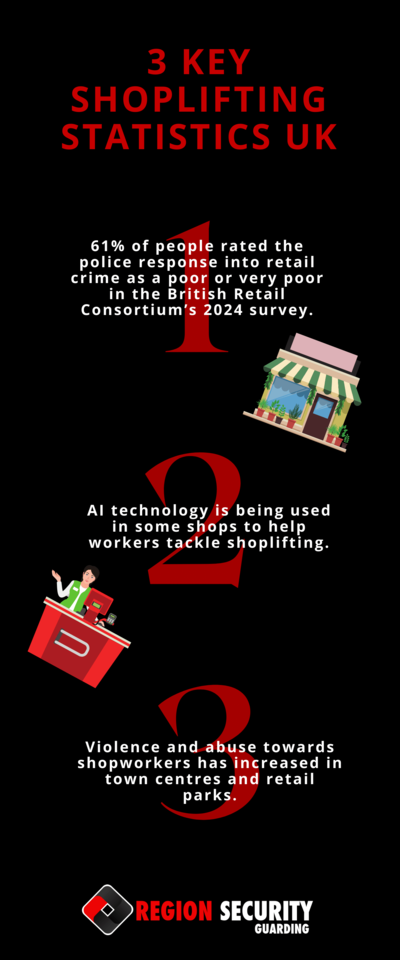
Shoplifting Incidents Reach Alarming Levels in the UK, Survey Reveals
A recent poll indicates that nearly a quarter of the UK population has witnessed shoplifting in the past year, highlighting a growing issue of retail crime across the nation.
A survey conducted by the British Retail Consortium (BRC) in collaboration with Opinium has revealed that approximately 23% of the UK population has witnessed shoplifting in the last year, equating to over 16 million individuals observing such incidents.
The survey also highlighted concerning trends in retail worker safety, with 23% of respondents reporting witnessing verbal or physical abuse towards shop staff, encompassing various forms of maltreatment including racial abuse, sexual harassment, physical assaults, or threats involving weapons.
Regionally, Nottingham reported the highest incidence of shoplifting, with 32% of residents having witnessed theft.
This was followed closely by London at 29%, Southampton at 28%, and Leeds at 26%.
Conversely, Plymouth and Belfast had the lowest reported rates of witnessing shoplifting, at 12% and 13%, respectively.
This survey follows a previous report indicating record levels of retail crime in the UK, with figures suggesting 20 million incidents of theft and violence occurring last year, leading to over 2,000 daily reports of violence and abuse against retail staff.
The shopworkers’ union Usdaw also conducted a survey revealing that 77% of retail employees had experienced some form of abuse while on the job, with 53% reporting threats, and 10% indicating they were assaulted.
Financially, the impact of retail crime on businesses was significant, with losses amounting to £4.2 billion in the previous year alone.
This included £2.2 billion in theft and an additional £1.8 billion allocated to crime prevention measures such as the implementation of CCTV systems, hiring of security personnel, and the use of anti-theft devices and body-worn cameras.
In light of these rising incidents, the UK government is progressing with the Crime and Policing Bill, which aims to introduce a separate offence for assaulting a retail worker with a proposed maximum sentence of six months.
Additionally, the bill seeks to eliminate the £200 low-value threshold for shoplifting, establishing that the maximum penalty for shop theft could increase to seven years, irrespective of the value of the goods stolen.
Helen Dickinson, chief executive of the BRC, expressed grave concerns about the normalization of theft and abuse in the retail sector, stressing the lasting psychological effects these incidents can have on witnesses and victims.
Dickinson emphasized the need for the Crime and Policing Bill to provide comprehensive protections for all retail workers, highlighting that the current proposal does not extend the same safeguards to customer-facing roles in England and Wales as those in Scotland.
The Association of Convenience Stores (ACS) recently published its 2025 Crime Report, which disclosed that local shops in the UK recorded an estimated 6.2 million incidents of shop theft in the last year, an increase from 5.6 million the previous year.
The report also noted over 59,000 occurrences of violence within the convenience sector and 1.2 million incidents of verbal abuse.
Additionally, 59% of retail businesses indicated a belief that incidents related to organized crime have risen over the past year.
The survey also highlighted concerning trends in retail worker safety, with 23% of respondents reporting witnessing verbal or physical abuse towards shop staff, encompassing various forms of maltreatment including racial abuse, sexual harassment, physical assaults, or threats involving weapons.
Regionally, Nottingham reported the highest incidence of shoplifting, with 32% of residents having witnessed theft.
This was followed closely by London at 29%, Southampton at 28%, and Leeds at 26%.
Conversely, Plymouth and Belfast had the lowest reported rates of witnessing shoplifting, at 12% and 13%, respectively.
This survey follows a previous report indicating record levels of retail crime in the UK, with figures suggesting 20 million incidents of theft and violence occurring last year, leading to over 2,000 daily reports of violence and abuse against retail staff.
The shopworkers’ union Usdaw also conducted a survey revealing that 77% of retail employees had experienced some form of abuse while on the job, with 53% reporting threats, and 10% indicating they were assaulted.
Financially, the impact of retail crime on businesses was significant, with losses amounting to £4.2 billion in the previous year alone.
This included £2.2 billion in theft and an additional £1.8 billion allocated to crime prevention measures such as the implementation of CCTV systems, hiring of security personnel, and the use of anti-theft devices and body-worn cameras.
In light of these rising incidents, the UK government is progressing with the Crime and Policing Bill, which aims to introduce a separate offence for assaulting a retail worker with a proposed maximum sentence of six months.
Additionally, the bill seeks to eliminate the £200 low-value threshold for shoplifting, establishing that the maximum penalty for shop theft could increase to seven years, irrespective of the value of the goods stolen.
Helen Dickinson, chief executive of the BRC, expressed grave concerns about the normalization of theft and abuse in the retail sector, stressing the lasting psychological effects these incidents can have on witnesses and victims.
Dickinson emphasized the need for the Crime and Policing Bill to provide comprehensive protections for all retail workers, highlighting that the current proposal does not extend the same safeguards to customer-facing roles in England and Wales as those in Scotland.
The Association of Convenience Stores (ACS) recently published its 2025 Crime Report, which disclosed that local shops in the UK recorded an estimated 6.2 million incidents of shop theft in the last year, an increase from 5.6 million the previous year.
The report also noted over 59,000 occurrences of violence within the convenience sector and 1.2 million incidents of verbal abuse.
Additionally, 59% of retail businesses indicated a belief that incidents related to organized crime have risen over the past year.










